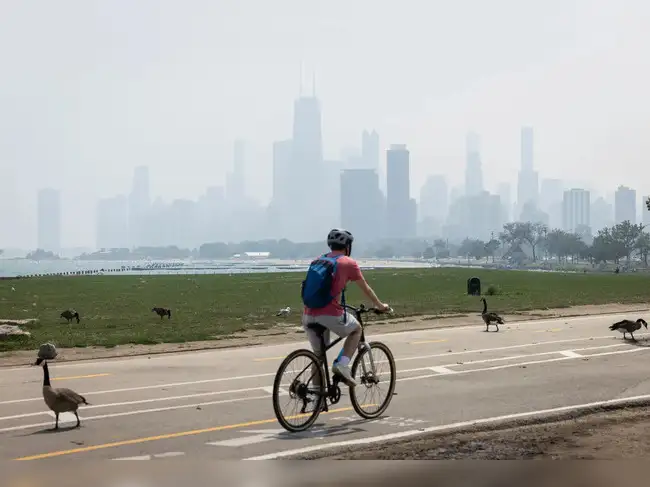Synopsis
Due to Canadian wildfires, New York State issued an air quality health advisory effective until midnight August 4, impacting numerous counties and New York City. The advisory, triggered by high levels of fine particulate matter, urges individuals, especially those with respiratory or heart conditions, children, and the elderly, to limit outdoor activities.
 AP
APA massive cloud of smoke is wreathing New York City leading concerned monitoring groups to issue an Air Quality Health Advisory
Canadian wildfires prompted the New York State Department of Environmental Conversation to issue an air quality health advisory for most parts of the New York in effect until midnight August 4. The air quality alert has been issued for Oneida, Yates, Seneca, Cayuga, Onondaga, Steuben, Schuyler, Chemung, Tompkins, Madison, Cortland, Chenango, Otsego, Tioga, Broome, Delaware and Sullivan counties, according to local media reports.
“The New York State Department of Environmental Conservation at Albany has issued a Air Quality Health Advisory for Fine Particulates until midnight tonight,” states the weather service.
ALSO READ: Trading and cooking event update: How to make cooking recipe in Grow a Garden
New York air quality
A massive cloud of smoke is wreathing New York City leading concerned monitoring groups to issue an Air Quality Health Advisory. The smoke comes from a terrifying number of wildfires burning across the border in Canada.
ALSO READ: Severe thunderstorms warning for two Texas counties after deadly flash flood killed 135. Here’s what you can do
The New York state Department of Health has urged individuals — especially those with asthma, heart or lung conditions, the elderly, and young children — to limit prolonged or strenuous outdoor activities during this period. Those experiencing symptoms such as shortness of breath, coughing, or wheezing should consider contacting their healthcare provider.
According to Mirror, New York State Department of Environmental Conservation (DEC) Commissioner Amanda Lefton and State Department of Health (DOH) Commissioner Dr. James McDonald are issuing an updated Air Quality Health Advisory for fine particulate matter.
This was put in place due to smoke from wildfires in Canada billowing down from the North. There is also the potential for visible smoke and hazy skies across the state and New Yorkers may see temporary spikes in smoke-related pollution. DEC and DOH issue Air Quality Health Advisories when DEC meteorologists predict levels of pollution, either ozone or fine particulate matter (PM2.5), are expected to exceed an Air Quality Index (AQI) value of 100.
The air quality health advisory covers large swathes of New York and surrounding state including Orang, Putnam, Rockland and Westchester counties as well as the five boroughs of New York City (Manhattan, Bronx, Staten Island, Brooklyn and Queens). It also covers parts of Central New York, Western New York, Eastern Lake Ontario, and Adirondack regions. The alert also covers parts of Central New York, Western New York, Eastern Lake Ontario, and Adirondack regions.
ALSO READ: Karoline Leavitt, 27, has a net worth of $7 million: Here’s the secret behind how Trump’s youngest star amassed such fortune
What should the New Yorkers do?
The Alert runs for the entire of Monday – midnight to midnight local time (EDT). The Department of Environmental Conservation warns: “Exposure can cause short-term health effects, such as irritation to the eyes, nose, and throat, coughing, sneezing, runny nose, and shortness of breath.
“Exposure to elevated levels of fine particulate matter can also worsen medical conditions such as asthma and heart disease. People with heart or breathing problems, and children and the elderly may be particularly sensitive to PM 2.5.”
ALSO READ: Duke Dennis handcuffed after bizarre mall game in San Antonio. What are the charges against him?
The NWS adds: “People who may be especially sensitive to the effects of elevated levels of pollutants include the very young, and those with preexisting respiratory problems such as asthma or heart disease. Those with symptoms should consider consulting their personal physician.”
You can track air quality in New York through the state Department of Environmental Conservation’s Air Quality Index by visiting dec.ny.gov. Air quality across the country can also be tracked through fire.airnow.gov.

